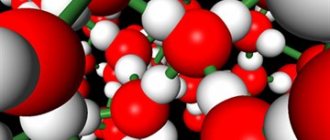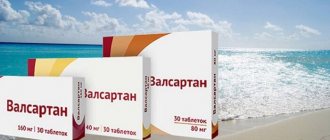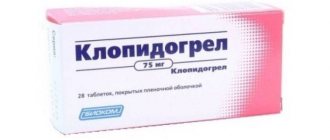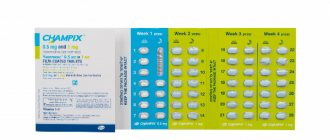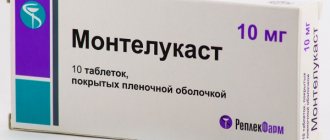Pharmacodynamics and pharmacokinetics
The active substance is quinapril . The mechanism of action is aimed at competitively blocking the angiotensin-converting enzyme and reducing the rate of transition of angiotensin-1 to angiotensin-2.
Accupro increases exercise tolerance, IOC, reduces wedge pressure in the capillaries of the pulmonary system, and reduces afterload.
Long-term therapy triggers the reverse development of myocardial hypertrophy in patients with arterial hypertension, and improves blood flow in damaged, ischemic myocardium.
Quinapril is able to increase renal and coronary blood flow and reduce platelet aggregation.
After a single dose, the drug begins to act effectively within an hour. A full therapeutic effect is recorded within several weeks of treatment.
Pharmacological properties of the drug Accupro
Quinapril hydrochloride (INN - Quinaprilum) is an ethyl ester of the ACE inhibitor quinaprilate, which does not contain a sulfide group. When the drug is taken orally, quinapril rapidly deesterifies to quinapril (a diacid of quinapril, the main metabolite), which is an effective ACE inhibitor. The mechanism of action of quinapril is to inhibit circulating blood and tissue ACE, which reduces vasopressor activity and aldosterone secretion. A decrease in the level of angiotensin II through a feedback mechanism leads to an increase in the secretion of renin and its activity in the blood plasma. Although the main mechanism of the antihypertensive effect is believed to be through the renin-angiotensin-aldosterone system, quinapril exhibits antihypertensive effects even in patients with low-renin hypertension (arterial hypertension). Prescribing quinapril to patients with moderate to severe hypertension (arterial hypertension) at a dose of 10–40 mg leads to a decrease in blood pressure in both sitting and standing positions, with minimal effect on heart rate. The antihypertensive effect develops within 1 hour, the maximum effect occurs 2-4 hours after taking the drug. In some patients, a stable hypotensive effect is observed after 2 weeks of treatment. When used in recommended doses, the antihypertensive effect of the drug is maintained in most patients for 24 hours and persists with prolonged use of the drug. The decrease in blood pressure caused by quinapril is accompanied by a decrease in peripheral vascular resistance and renal vascular resistance with little or no change in heart rate, cardiac index, renal blood flow, glomerular filtration rate and filtration fraction. After oral administration, the maximum concentration of quinapril in the blood plasma is achieved within 1 hour. Approximately 60% of the drug is absorbed, systemic bioavailability in the form of quinapril is 38%. The maximum plasma concentration of quinapril is achieved approximately 2 hours after oral administration of quinapril. The half-life of plasma elimination is about 1 hour. Quinaprilat is eliminated mainly by renal excretion and has a half-life of effective cumulation (approximately 3 hours). Approximately 97% of quinapril or quinaprilat circulating in blood plasma is protein bound. In patients with renal impairment, the half-life of quinaprilat increases with a decrease in creatinine clearance. Pharmacokinetic studies conducted in patients with severe renal impairment undergoing chronic hemodialysis or continuous ambulatory peritoneal dialysis indicate that dialysis does not have a significant effect on the clearance of quinapril and quinalaprilat. There is a linear correlation between plasma clearance of quinalaprilat and creatinine clearance. Elimination of quinalaprilat is also reduced in elderly patients (over 65 years of age). Concentrations of quinalaprilat are reduced in patients with alcoholic cirrhosis due to impaired deesterification of quinapril. Quinapril and its metabolites do not penetrate the BBB.
Contraindications
Accupro is not prescribed for intolerance to quinapril, during pregnancy , hypersensitivity to ACE inhibitors, or during breastfeeding.
With idiopathic, hereditary forms of angioedema , with cardiovascular disease, cerebrovascular disease, diabetes mellitus, severe forms of autoimmune systemic connective tissue diseases (scleroderma, systemic lupus erythematosus ), with aortic stenosis, stenosis of the arteries of two kidneys, with hyperkalemia, after surgical treatment for kidney transplantation, pathology of the renal system, liver, elderly people, diarrhea, vomiting Accupro is prescribed with caution, after preliminary consultation with specialists.
Directions for use and dosage of Accupro
When treating arterial hypertension, patients not receiving diuretics are prescribed 10 or 20 mg of the drug once a day. The dose may be increased depending on the clinical effect. Maintenance dose - 20 or 40 mg per day, usually prescribed in one or two doses. The dose is changed at intervals of four weeks. In most cases, it is possible to achieve adequate blood pressure control during long-term therapy by using Accupro once a day. The maximum permissible daily dose is 80 mg.
For patients continuing to take diuretics, 5 mg of the drug is first prescribed, after which the dose is increased until the optimal effect is achieved.
The use of Accupro in patients with chronic heart failure is indicated as part of complex therapy with diuretics and/or cardiac glycosides. In this case, the initial dose is 5 mg 1 or 2 times a day. If the drug is well tolerated, the dose can be increased to 10-40 mg per day in 2 equal doses.
It is recommended to start Accupro therapy in patients suffering from impaired renal function with 5 mg of the drug once a day. The next day, if the initial dose is well tolerated, two doses per day can be prescribed. In the absence of deterioration in renal function or arterial hypotension, the dose can be increased at weekly intervals.
In elderly patients, the recommended starting dose is 10 mg once daily. Subsequently, it can be increased until the optimal therapeutic effect is achieved.
Side effects
Cardiovascular system: myocardial infarction, orthostatic collapse , ischemic stroke, deterioration of Raynaud's disease , deterioration of coronary artery disease, tachycardia, orthostatic hypotension.
Nervous system: fainting, depression, fatigue, headaches, dizziness, mood changes, paresthesia of the limbs , sensory disturbances, sleep disturbances, asthenia, confusion.
Sense organs: loss of taste, tinnitus, vestibular disorders, changes in visual perception.
Digestive system: disturbances in the functioning of the pancreas, pathology of the hepatic system, increased liver enzymes, decreased appetite, diarrhea, constipation , epigastric pain, dry mouth, hyperbilirubinemia.
Hematopoietic organs: pancytopenia, neutropenia , leukopenia, anemia, agranulocytosis.
Respiratory system: sinusitis, bronchospasm, bronchitis, dry cough , rhinitis .
Genitourinary system: decreased potency, urinary retention, proteniuria, hypercreatininemia , increased urea levels, urinary retention.
Possible development of allergic reactions , glossitis , itching, exudative erythema multiforme, hyponatremia, hyperkalemia , myalgia, hyperthermia, exfoliative dermatitis, photosensitivity, arthralgia, alopecia .
Interaction
Accupro enhances the effects of ethanol.
When taking procainamide, immunosuppressants , cytostatics, allopurinol of leukopenia increases .
Quinapril enhances the hypoglycemic effect of insulin, sulfonylureas and its derivatives.
Narcotic analgesics, diuretics, antihypertensive drugs, and drugs for general anesthesia enhance the hypotensive effect of Accupro.
When taking table salt or NSAIDs, a weakening of the effect is observed.
Potassium-sparing diuretics (triamterene, spironaloctone, amiloride) potassium supplements cause hyperkalemia.
When taking estrogen, a weakening of the hypotensive effect due to fluid retention in the body is recorded.
The risk of agranilocytosis and neutropenia increases when taking medications that depress the bone marrow.
Pharmacological compatibility
The drug Accupro for blood pressure affects the pharmacological properties of other medications:
- increases the pharmacological effect of ethyl alcohol;
- increases the antidiabetic properties of insulin, sulfonal and derivatives;
- provokes the development of hyperkalemia when taking potassium-containing and potassium-sparing drugs;
- increases the likelihood of a decrease in the number of leukocytes when taking immunosuppressants, cytostatic drugs, procainamide, allopurinol.
Regarding the compatibility of Accupro with other drugs, you should consult your doctor.
A decrease in the hypotensive effect of Accupro was noted when taking:
- narcotic painkillers;
- other antihypertensive drugs;
- general anesthesia drugs;
- large amounts of salt;
- non-steroidal anti-inflammatory drugs;
- estrogens.
special instructions
For patients with reduced blood volume, diarrhea, vomiting, limited salt intake, or taking diuretics, Accupro is prescribed with caution due to the risk of a sharp drop in blood pressure.
If transient hypotension develops, the drug is not discontinued, the dosage is reduced, and the pressure is stabilized.
If there is a sharp drop in blood pressure, the patient is placed in a horizontal position and saline is injected to increase the blood volume.
It is recommended to discontinue diuretics 2-3 days before the start of therapy, except in cases of malignant hypertension.
In case of decompensated CHF and malignant arterial hypertension, therapy with quinapril is started in a hospital setting.
Monitoring the level of leukocytes, hemoglobin, potassium, urea, creatinine, and liver enzymes is required.
The simultaneous use of AN69 dialysis membranes is unacceptable due to the risk of anaphylactoid reactions.
Newborn children whose mothers took quinapril during treatment are carefully monitored in order to timely diagnose oliguria, hypotension, and hyperkalemia .
With the development of oliguria, renal perfusion is required by infusion of vasoconstrictor drugs, appropriate fluids, and maintenance of blood pressure. In infants and newborns, the development of oliguria and neurological symptoms occurs with a drop in blood pressure and a decrease in cerebral and renal blood flow.
Accupro affects the driving of vehicles. Patients should be careful when performing physical activities in hot weather due to the risk of dehydration and hypotension.
Before performing a surgical intervention, the anesthesiologist and surgeon must be warned about taking the drug.
Side effects of the drug Accupro
Usually mild and short-lived. The most common side effects observed in controlled trials were headache (7.2%), dizziness (5.5%), cough (3.9%), fatigue (3.5%), rhinitis (3.2%). ), nausea and/or vomiting (2.8%), myalgia (2.2%). It should be noted that the cough is usually non-productive and persistent and disappears after cessation of therapy. Clinically, adverse reactions are probably, possibly or definitely associated or uncertainly associated with quinapril therapy (with or without concomitant diuretic therapy) in controlled and uncontrolled studies and less frequently reported in clinical studies or after registration surveillance * include.
Disorders of the hematopoietic and lymphatic system : hemolytic anemia*, thrombocytopenia*. From the immune system: anaphylactoid reactions*. From the side of the central nervous system: vertigo, nervousness, depression, drowsiness. From the organ of vision: amblyopia. From the cardiovascular system: angina pectoris, palpitations, tachycardia, postural hypotension*, syncope*, vasodilation. From the digestive system: dry mouth or throat, flatulence, pancreatitis*. For the skin: alopecia*, exfoliative dermatitis*, itching, increased sweating, pemphigus*, photosensitivity reactions*, skin rash. From the musculoskeletal system: arthralgia From the genitourinary system: urinary tract infections, impotence. General disorders and reactions at the injection site: edema (peripheral and generalized), Isolated side effects: angioedema* was observed in 0.1% of patients using quinapril. Sometimes, as with the use of other ACE inhibitors, eosinophilic pneumonitis* and hepatitis were observed with the use of quinapril. Results of clinical laboratory tests: rarely - agranulocytosis and neutropenia (their cause-and-effect relationship with the use of quinapril is unreliable), hyperkalemia. Creatinine and blood urea nitrogen. Increases (more than 1.25 times the upper limit of normal) in serum creatinine and urea nitrogen levels were observed in 2 and 2% of cases, respectively, during quinapril therapy. An increase is more likely in patients receiving the drug in combination with diuretics than in patients receiving quinapril monotherapy. Angioedema. Angioedema has been reported in patients receiving ACE inhibitors (including 0.1% of patients receiving quinapril). If the patient develops angioedema of the larynx, face, tongue, use of quinapril should be stopped immediately; the patient should be given adequate therapy and observed until the swelling completely disappears. If swelling appears only on the face and lips, specific treatment is not required in most cases; To eliminate symptoms, it is advisable to use antihistamines. Angioedema of the tongue, larynx and glottis can be life-threatening. If it develops, appropriate emergency therapy should be immediately prescribed, necessarily including the subcutaneous administration of 0.3–0.5 ml of adrenaline (epinephrine) solution (1:1000). Patients with a history of angioedema not related to ACE inhibitor therapy are also at increased risk of angioedema during treatment with an ACE inhibitor. In patients of the Negroid race who were treated with ACE inhibitors, cases of angioedema were more common than in patients of other races. In patients of the Negroid race, a slightly smaller effect of ACE inhibitors on blood pressure was also noted compared to other races. Intestinal angioedema. In patients using ACE inhibitors, manifestations of intestinal angioedema were observed. Such patients complained of abdominal pain (with/without nausea or vomiting); in some cases, there was no indication in the anamnesis of the development of angioedema of the face and a normal level of C-1 esterase was determined. The diagnosis of angioedema was made using abdominal computed tomography or ultrasound or during surgery. These manifestations disappeared after stopping the drug. Intestinal angioedema should be included in the differential diagnosis in patients with abdominal pain who are receiving ACE inhibitor therapy. Patients with a history of angioedema not related to ACE inhibitor therapy may have an increased risk of angioedema during treatment with an ACE inhibitor. Anaphylactoid reactions. Desensitization . Life-threatening anaphylactoid reactions have been observed in patients receiving ACE inhibitors during desensitization therapy to Hymenoptera venom. In some patients, these reactions did not occur during a temporary break in taking ACE inhibitors, but occurred again with an accidental re-provocation. Low-density lipoprotein apheresis. In patients who underwent LDL apheresis with dextran sulfate absorption, anaphylactoid reactions were observed with concomitant therapy with an ACE inhibitor. Hemodialysis Clinical data have shown that patients undergoing hemodialysis using certain types of high-flux membranes (polyacrylonitrile membranes) may develop anaphylactoid reactions while receiving an ACE inhibitor. This combination should be avoided by using alternative antihypertensive drugs or alternative hemodialysis membranes. Arterial hypotension. In patients with uncomplicated hypertension (arterial hypertension) receiving Accupro, hypotension rarely developed, but it was a likely consequence of therapy with ACE inhibitors in patients with impaired water and electrolyte balance due to taking diuretics, following a low-salt diet, or dialysis. In patients with congestive heart failure, in whom the risk of developing severe hypotension is particularly high, treatment with quinapril should be initiated at the recommended dose under medical supervision; These patients should be monitored during the first 2 weeks of treatment and whenever the dose of quinapril is increased. If symptomatic hypotension develops, the patient should be placed on his back and, if necessary, given an intravenous infusion of isotonic sodium chloride solution. A short-term hypotensive reaction is not a contraindication for further use of the drug; however, if such a reaction develops, the use of lower doses of the drug or discontinuation of diuretics should be considered. Patients who received diuretic therapy at the beginning of treatment with quinapril may develop symptomatic hypotension. It is advisable to discontinue the diuretic 2–3 days before starting treatment with quinapril. If blood pressure is not controlled with quinapril monotherapy, diuretics should be resumed. If the use of diuretics cannot be avoided, the use of Accupro should be started with a low initial dose. Neutropenia and agranulocytosis . Taking ACE inhibitors can sometimes be accompanied by agranulocytosis and bone marrow depression in patients with uncomplicated hypertension (arterial hypertension), but more often occurs, as a rule, in patients with renal failure, as well as collagen diseases. When using ACE inhibitors in patients with collagen diseases and/or renal failure, regular monitoring of the leukocyte count is necessary. Cough. Cough has sometimes occurred in patients using ACE inhibitors, including quinapril. Usually the cough was non-productive, persistent and disappeared after cessation of therapy. Cough induced by the use of ACE inhibitors should be considered in the differential diagnosis of cough.
Analogues of Accupro
Level 4 ATC code matches:
Dilaprel
Prenesa
Enap
Diroton
Lipril
Renipril
Parnavel
Fozinap
Tritace
Enam
Zokardis
Fosinopril
Lisinopril
Captopril
Monopril
Renitek
Hartil
Phosicard
Amprilan
Ramipril
Analogs include the following drugs: Akurenal , Quinafar .
Accupro price, where to buy
30 tablets of 20 mg cost 430-530 rubles.
The price of Accupro in 40 mg tablets is 470-560 rubles per pack of 30 pieces.
- Online pharmacies in RussiaRussia
- Online pharmacies in UkraineUkraine
ZdravCity
- Accupro tab.
p/o captivity. 10 mg No. 30 Pfizer Manufacturing Deutschland GmbH 605 rub. order - Accupro tab. p/o captivity. 40 mg No. 30 Pfizer Manufacturing Deutschland GmbH
RUR 681 order
Pharmacy Dialogue
- Accupro tablets p/o 10 mg No. 30Pfizer
RUR 648 order
- Accupro tablets 20mg No. 30Pfizer
RUR 647 order
- Accupro (tablet p/o 40 mg No. 30) Pfizer
710 rub. order
show more
Pharmacy24
- Accupro 20 mg No. 30 tablets Pfizer Menufecchuring Deutschland GmbH, Nimechchina
253 UAH.order - Accupro 10 mg No. 30 tablets Pfizer Menufecchuring Deutschland GmbH, Nimecchina
213 UAH order
Brief information about the drug
Release form
The drug is produced in the form of tablets. There are tablets on sale with different amounts of active substance in the composition, which affects the shape and color of the capsule:
- 5 mg tablets: white, oval shape, engraved “5” on one side;
- 10 mg tablets: white, triangular shape, engraved “10” on one side;
- 20 mg tablets: white, round shape on one side - engraved “20”;
- 40 mg tablets: red-brown color, oval shape, engraved “40” on one side.
The tablets are film-coated.
Tablets are stored in individual cellular packaging. The kit includes instructions for using Accupro.
Compound
The main active ingredient in Accupro is quinapril in dosages of 5, 10, 20, 40 mg.
Other components of the tablet:
- magnesium carbonate;
- gelatin;
- lactobiose;
- polyvidone;
- magnesium stearate.
The composition of the film shell includes:
- hydroxypropyl methylcellulose;
- titanium dioxide;
- polyethylene glycol 400;
- herbal wax
Accupro tablets
pharmachologic effect
A drug from the group of ACE inhibitors has a hypotensive effect.
Manufacturer
Pfizer Manufacturing Deutschland, Germany.
Storage conditions and periods
It is recommended to store the drug out of the reach of children. The storage temperature should not be higher than 25 degrees. The shelf life of the drug is 3 years. The production date and shelf life can be found on the packaging.
Conditions for dispensing from a pharmacy
The drug is dispensed in pharmacies with a doctor's prescription.
Price
The price of Accupro tablets is 430-560 rubles and depends on the form of release.
